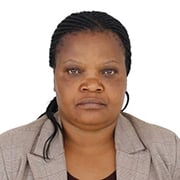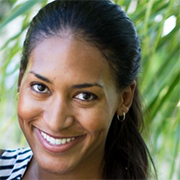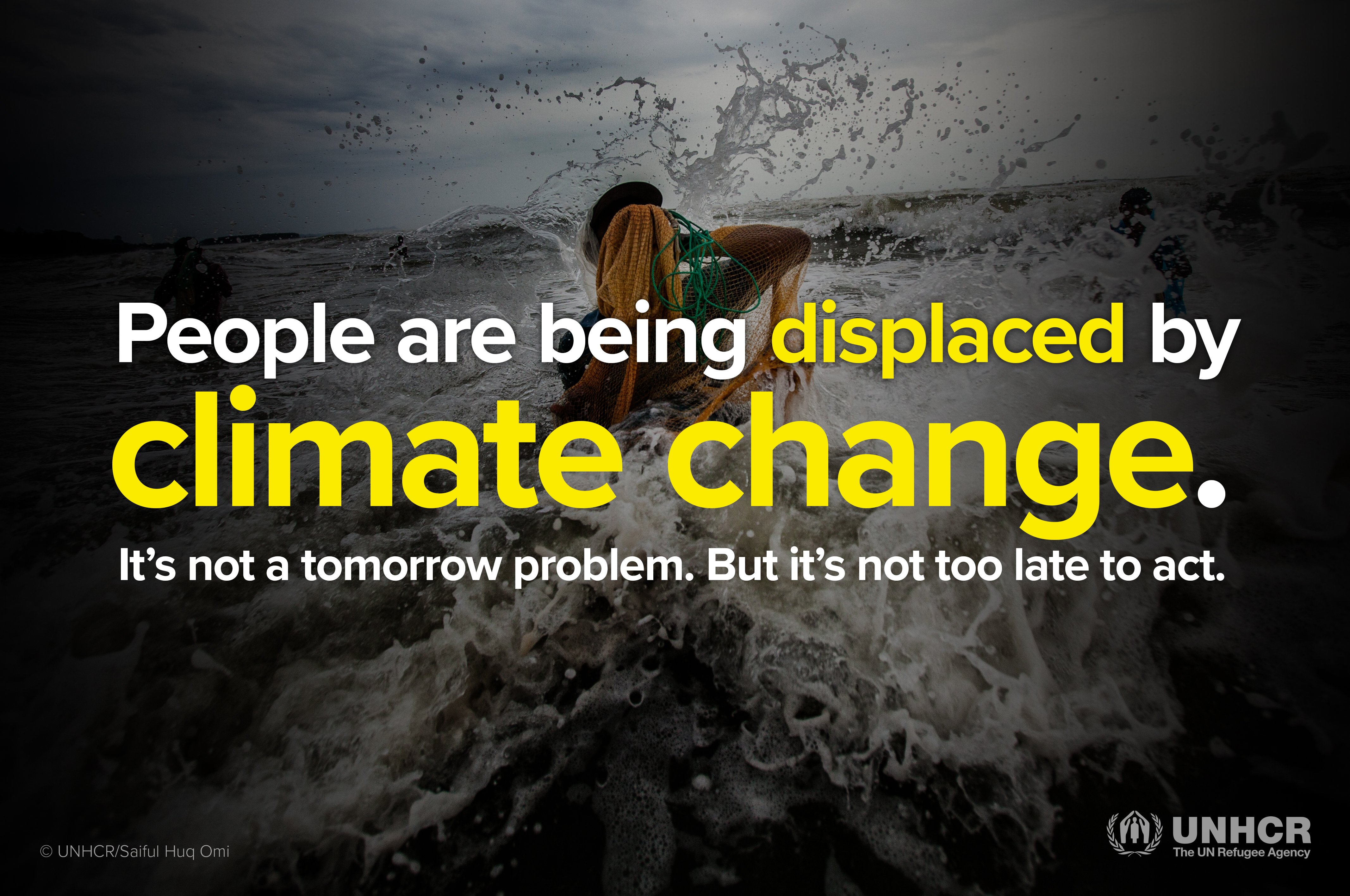Climate action
Wednesday 30 September 2020, 11:00 - 12:30 (CEST)
Wednesday 30 September 2020, 11:00 - 12:30 (CEST)
The session will feature a light panel discussion where speakers will bring their varied perspectives, lessons learned and best practices in disaster displacement situations, in greening operations, and in assisting communities adapt and build resilience in the context of climate change.
Emphasis will be put on gender-transformative responses, and on how grassroots movements can strengthen Climate Action and protection. Critically, speakers will highlight the increased risk climate change and COVID-19 pose to displaced populations, and share any best practices that can be replicated for the current and future pandemics, as well as lessons learned from the COVID-19 response that can be applied to Climate Action.
The majority of the session will be interactive, and participants are encouraged to bring questions, best practices from their organizations and ideas to enhance collaboration moving forward.
 Andrew Harper is responsible for providing strategic guidance, oversight and expertise to shape UNHCR's climate action agenda. Prior to his current tasks, he was the Director of the Division of Programme Support & Management (DPSM), where he oversaw programme policy, planning and management, as well as technical support to field operations.
Andrew Harper is responsible for providing strategic guidance, oversight and expertise to shape UNHCR's climate action agenda. Prior to his current tasks, he was the Director of the Division of Programme Support & Management (DPSM), where he oversaw programme policy, planning and management, as well as technical support to field operations.
Andrew has led the Innovation Service in UNHCR and was responsible for leading and coordinating the international response to the Syrian Crisis in Jordan. Some of the main achievements included responding to, at the time, the largest refugee crisis in the world, the establishment of the Zaatari and Azraq refugee camps, introducing biometric registration and linking that to the world’s largest biometric based refugee cash assistance programme.
Andrew also served as the Head of Desk for UNHCR, covering the Iraq Situation, as well as the Emergency Focal Point for the Middle East and North Africa region for the Libyan Crisis.
He has previously worked notably for the Australian Ministry of Foreign Affairs and UNOCHA, and in various field locations with UNHCR, including Central and Southeast Asia, the Western Balkans, Islamic Republic of Iran and Ukraine.
 A social scientist by academic training, Sajedul Hasan is an international humanitarian and development professional with about 30 years of experience in providing leadership, technical and program assistance in the areas of disaster risk reduction, emergency response, conflict mitigation, food security and strategic policy formulation. He has extensively worked in Asia and Africa with different program components around sustainable development, emergency preparedness and humanitarian programme management. He is currently providing leadership support to BRAC’s Rohingya Humanitarian Programme in Cox’s Bazar, Bangladesh.
A social scientist by academic training, Sajedul Hasan is an international humanitarian and development professional with about 30 years of experience in providing leadership, technical and program assistance in the areas of disaster risk reduction, emergency response, conflict mitigation, food security and strategic policy formulation. He has extensively worked in Asia and Africa with different program components around sustainable development, emergency preparedness and humanitarian programme management. He is currently providing leadership support to BRAC’s Rohingya Humanitarian Programme in Cox’s Bazar, Bangladesh.
 Mary Obiero is multi-skilled professional with 20+ years’ experience in program design and management, including working with partners implementing integrated programs in different thematic sectors namely; WASH, Food Security, Community Livelihoods, Education, Youth empowerment, Emergency Response and Disaster Risk Management with Gender Sensitivity Lenses in Africa. Mary is an advocate of the inclusion of gender equality and women’s empowerment issues in sustainable development this occasioned a study on integrated rural development for GBV mitigation in pastoral communities: the case of West Pokot, Kenya. Her works includes developing networks and partnerships with appropriate Government Ministries and officials, civil society and other stakeholders for gender equality and women’s empowerment in relation to strategic priorities in the region.
Mary Obiero is multi-skilled professional with 20+ years’ experience in program design and management, including working with partners implementing integrated programs in different thematic sectors namely; WASH, Food Security, Community Livelihoods, Education, Youth empowerment, Emergency Response and Disaster Risk Management with Gender Sensitivity Lenses in Africa. Mary is an advocate of the inclusion of gender equality and women’s empowerment issues in sustainable development this occasioned a study on integrated rural development for GBV mitigation in pastoral communities: the case of West Pokot, Kenya. Her works includes developing networks and partnerships with appropriate Government Ministries and officials, civil society and other stakeholders for gender equality and women’s empowerment in relation to strategic priorities in the region.
 Nelson Tivane is a feminist and gender-responsiveness oriented social researcher. He has over six years of multidisciplinary working background in Mozambique, comprising development initiatives and Humanitarian Aid. His experience includes working with the UN agencies (UNHCR, WFP and FAO); International NGOs (Oxfam, Save the Children and CARE) and national Consulting Companies. Until April 2020, he was supporting the coordination of the Coordination Unit for COSACA Consortium, under a 2-years project funded by German Government. In his current role in NRC he is supporting the Government of Mozambique - National Institute for Disaster Management (INGC) - in developing guidelines on managing disaster displacement in line with the national disaster risk reduction strategies; and by referring to the Words into Action. Under IDAI and Kenneth cyclones response, Mr.Tivane coordinated Oxfam’s joint strategy for community engagement.
Nelson Tivane is a feminist and gender-responsiveness oriented social researcher. He has over six years of multidisciplinary working background in Mozambique, comprising development initiatives and Humanitarian Aid. His experience includes working with the UN agencies (UNHCR, WFP and FAO); International NGOs (Oxfam, Save the Children and CARE) and national Consulting Companies. Until April 2020, he was supporting the coordination of the Coordination Unit for COSACA Consortium, under a 2-years project funded by German Government. In his current role in NRC he is supporting the Government of Mozambique - National Institute for Disaster Management (INGC) - in developing guidelines on managing disaster displacement in line with the national disaster risk reduction strategies; and by referring to the Words into Action. Under IDAI and Kenneth cyclones response, Mr.Tivane coordinated Oxfam’s joint strategy for community engagement.
 Camille Davis started with CARE in 2008 and has assumed a variety of functions over the past 12 years including managing CARE’s Humanitarian Surge Fund, leading fundraising efforts, and coordinating the team’s annual planning. She provides programmatic and financial oversight for CARE’s portfolio of emergency grants ensuring good stewardship of resources. Camille has deployed to support many of CARE’s emergency operations over the years including ones in Cote d’Ivoire, Kenya, Mozambique, Ecuador, Turkey and Haiti. Camille has supported the development of CARE’s humanitarian transformational agenda which promotes understanding and addressing the distinct needs of women men, boys and girls as well as prioritizing women’s leadership in humanitarian response and market-based approaches in crisis recovery. Camille received her BA in International Relations from Macalester College in 2004 and a Masters of Public Administration with a concentration in Non-profit Management from Georgia State University in 2007.
Camille Davis started with CARE in 2008 and has assumed a variety of functions over the past 12 years including managing CARE’s Humanitarian Surge Fund, leading fundraising efforts, and coordinating the team’s annual planning. She provides programmatic and financial oversight for CARE’s portfolio of emergency grants ensuring good stewardship of resources. Camille has deployed to support many of CARE’s emergency operations over the years including ones in Cote d’Ivoire, Kenya, Mozambique, Ecuador, Turkey and Haiti. Camille has supported the development of CARE’s humanitarian transformational agenda which promotes understanding and addressing the distinct needs of women men, boys and girls as well as prioritizing women’s leadership in humanitarian response and market-based approaches in crisis recovery. Camille received her BA in International Relations from Macalester College in 2004 and a Masters of Public Administration with a concentration in Non-profit Management from Georgia State University in 2007.
